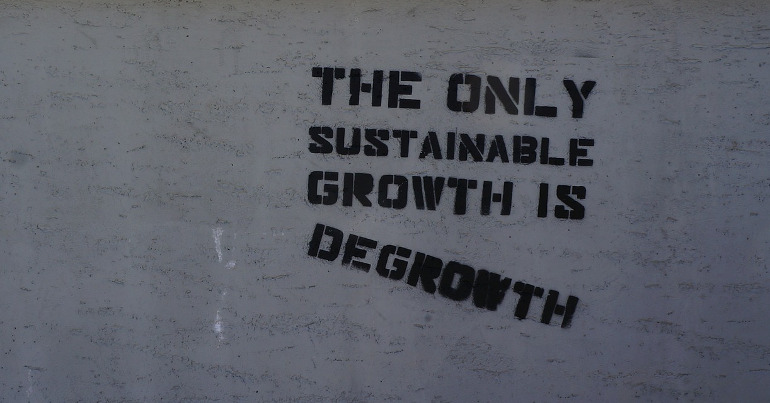The death of green growth

Human beings are optimistic. Maybe we have to be, in order to keep going. One illustration of that optimism is the notion of green Growth. We can, the story goes, keep growing our economy. It’s just that we have to ensure that we replace old, damaging ways with new greener ones. That way, we can save the environment with no pain.
Technological solutions to climate change
In our technological age, technology is naturally the saviour. When it comes to global warming, it does seem as if we might have at least half a chance of success. Power generation is moving steadily towards renewables, simply because they are becoming cheaper. Transport is going electric, although it’s very doubtful whether vehicle manufacturing can change production quickly enough to meet the demand.
Maybe we can deal with domestic heating, through a combination of improved insulation and heat pumps driven by renewable electricity. But it could take a lot longer to get there than we really have. It also involves a lot of expenditure just to stand still.
Optimists think that automated cars will revolutionise transport, but there are plenty of doubters. Self driving cars are getting along quite well in Arizona, where it is nearly always sunny. How well they can cope with British weather may be another matter. It’s also very unclear how far sharing will help, even assuming full automation. The desire for autonomy will still exist, and self driving vehicles will open up more travel opportunities, which could cancel out the gains. Forced cuts in movement will be hard to square with economic growth.
Tackling other problems
But global warming is only one issue. Maybe, as I wrote last month, Green Parties should be looking at other vital environmental concerns. Pollution is the obvious one, and pollution by plastic currently looks one of the most intransigent. In fact, we’ve only recently become aware just how big an issue we have to confront. Tiny plastic particles are getting everywhere. Most of them come from the dust created by vehicle tyre wear and from washing clothes made out of synthetics.
We thus have to face the fact that greening transport isn’t just a matter of fuel. It has other aspects that, right now, we haven’t the faintest idea how to fix. George Monbiot suggests that we need to phase out motor cars within ten years. That would certainly help, but it doesn’t sound at all consistent with green growth. We could wear natural fibres, although they have their own issues too.
Another huge problem area is agriculture. Although there are plenty of ideas around for more sustainable forms of agriculture, they usually have features such as requiring more manual labour. Bringing about global change quickly is difficult, and it is hard to see more environmental forms of farming contributing to green growth.
Lest we see a flicker of optimism, bear in mind that we are still discovering huge problems, such as plastic pollution. We can’t be confident that there aren’t other lurking dangers. The crux of the issue is that human activities have reached a scale where we just don’t seem to be able to get a handle on the consequences, let alone deal with them.
One obvious conclusion might be that there are just too many people. Changing that is extremely difficult, though. Greens are committed to human rights and justice, which rules out anything like mass extermination programmes. In fact, they’d be distasteful to almost everyone. But something like the Chinese one child policy seemed both inhumane and slow acting. It also creates the problems of a predominantly elderly society. That’s another nail in the coffin of green growth.
Beyond green growth
Where does that leave Green Parties? Unfortunately, all the options still leave tough challenges that won’t make electoral gains easy. If we can’t simply offer economic growth, as politicians have in the past, we can offer two other things. One is a society that tolerates much less inequality. The other is a better quality of life. Both are hard to sell.
For the last thirty years or more, the real beneficiaries of economic growth have been the most privileged in society. They will resist change, and they have plenty of resources to do so. Paradoxically, many people seem to like the possibility that they might be rich to the certainty of being less poor. Just as they are attracted to lotteries, people imagine that inequality has something to offer. And for the moment, all ills can be blamed on Europe. We have to rely on the strong evidence that everyone is happier in a more equal society.
When it comes to quality of life, turning the clock back is impossible. The pastoral idyll always had a dark side of poverty and ill health. All the same, we can strive for the rewards that come from a society that places value on each individual and every group. Hard to achieve, easy to mock, but a worthy objective.
Today’s cynical politics will place many obstacles in the way. But the alternative is a radical reduction in the human population brought about by war and pestilence. That may seem extreme, but it is the only logical outcome if there is no change in the political climate.




Leave a Reply